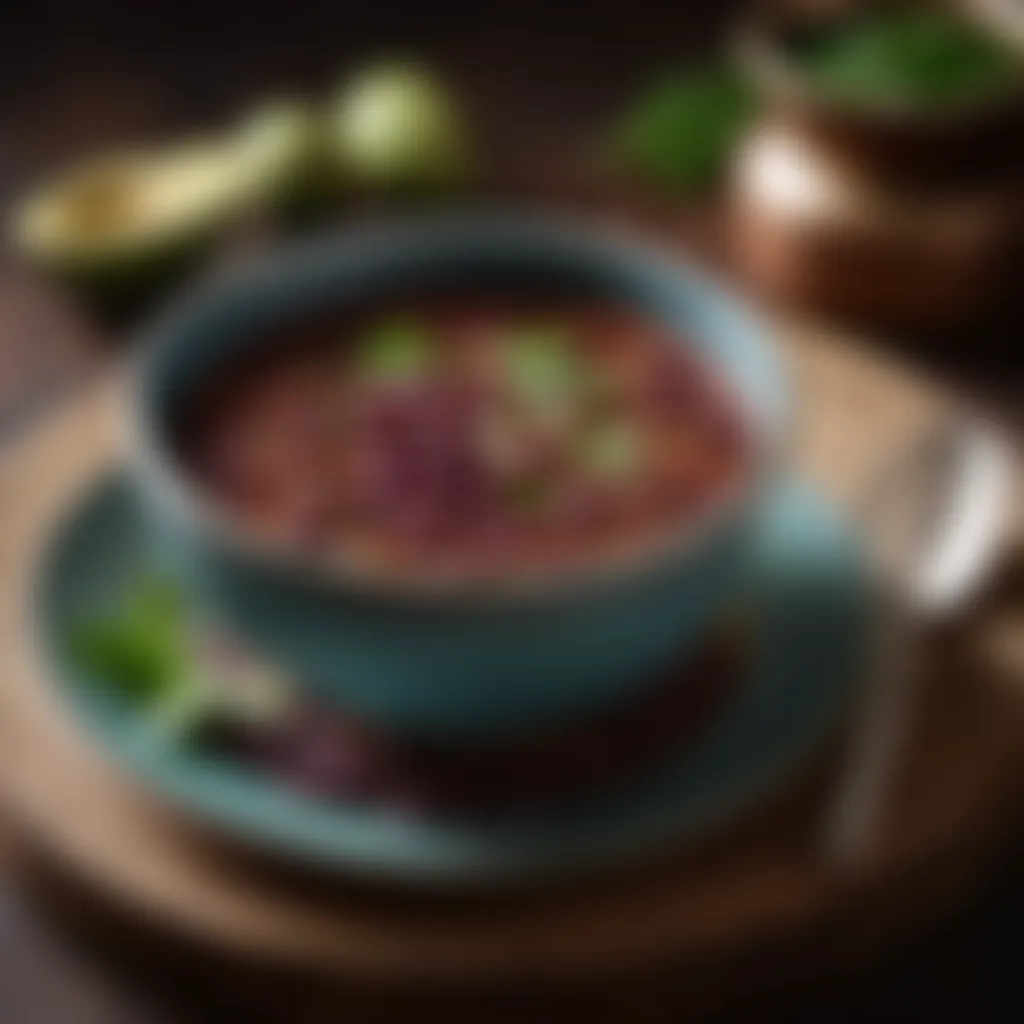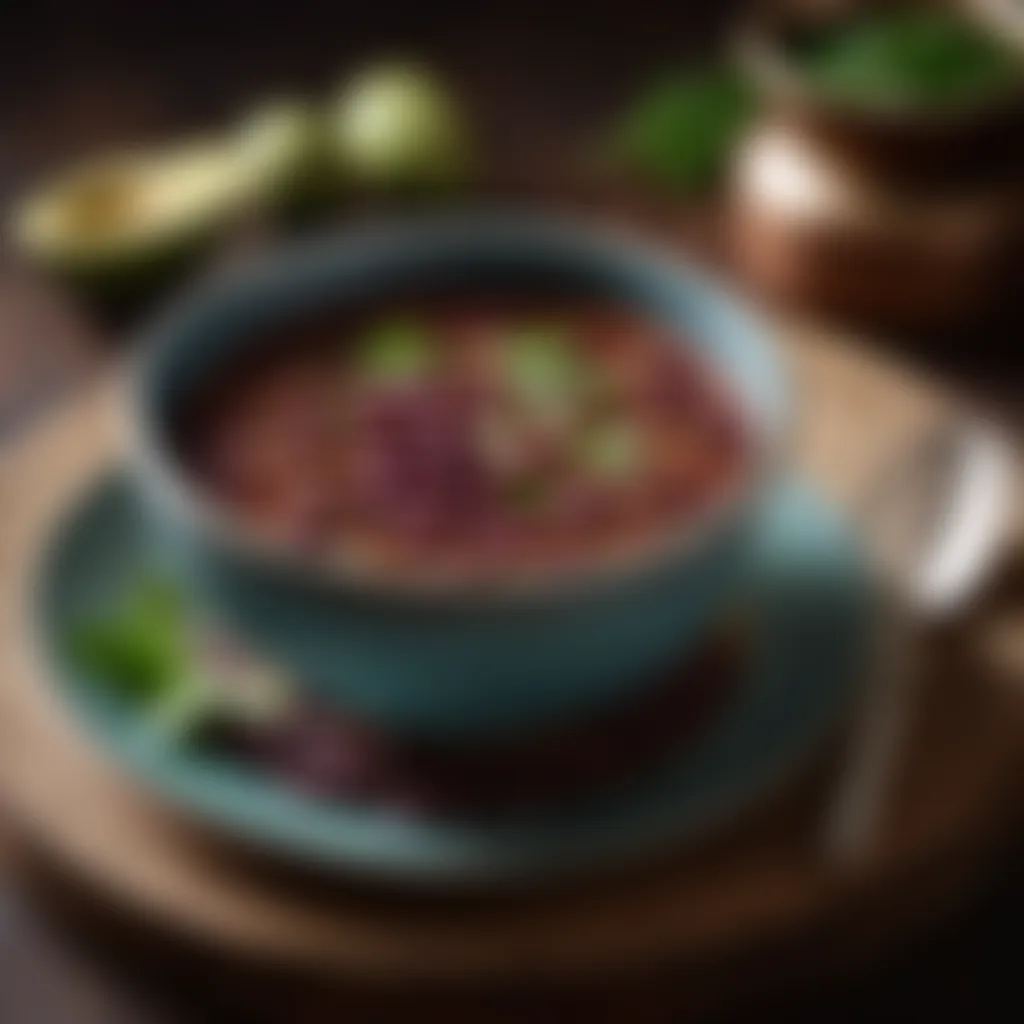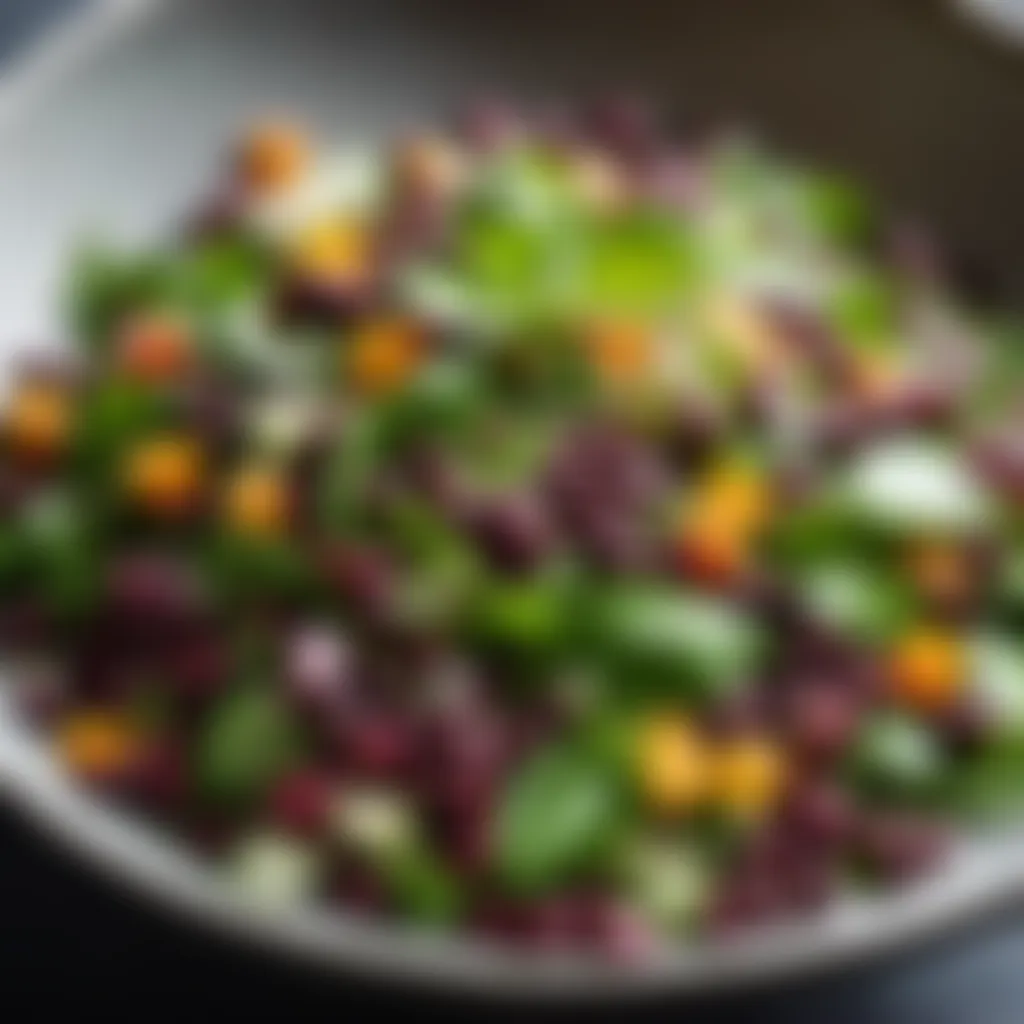Discovering Adzuki Beans: Recipes and Nutritional Insights


Intro
Adzuki beans, small in size yet mighty in nutritional value, often find themselves overshadowed by their larger counterparts like kidney or black beans. However, these little legumes deserve their moment in the spotlight. Their subtle sweetness and hearty texture make them a delightful addition to various dishes, transforming meals into wholesome experiences.
These beans, mainly cultivated in East Asia, are not just ingredients on a grocery shelf; they're steeped in cultural significance. From traditional sweets to hearty stews, the versatility of adzuki beans spans continents and culinary traditions. Let's take a closer look at how to incorporate adzuki beans into your daily cooking, beginning with the essentials: the ingredients needed for a classic adzuki bean dish.
Ingredients:
To create a delightful adzuki bean dish that is both nutritious and satisfying, the following ingredients are recommended:
- 1 cup adzuki beans (dried, rinsed and soaked for at least 4 hours or overnight)
- 4 cups water (for cooking)
- 1 medium onion (finely chopped)
- 3 cloves garlic (minced)
- 1-inch piece of ginger (grated)
- 1 medium carrot (diced)
- 1 bell pepper (diced, any color)
- 2 tablespoons soy sauce (or tamari for a gluten-free option)
- 1 tablespoon sesame oil
- 1 tablespoon olive oil
- 1 teaspoon cumin (ground)
- Salt and pepper (to taste)
- Fresh cilantro (for garnish, optional)
Preparation Steps:
- Soaking the Beans: Start by soaking the adzuki beans in plenty of water for at least 4 hours, or preferably overnight. This helps soften them and reduces cooking time.
- Chopping Vegetables: While the beans are soaking, prepare the vegetables. Dice the onion, carrot, and bell pepper. Mince the garlic and grate the ginger. Having everything ready will streamline the cooking process.
- Cooking the Beans: After soaking, drain the beans and place them in a pot with 4 cups of fresh water. Bring to a boil, then reduce to a simmer. Cook them for about 45 minutes until they are tender but not mushy.
- Sautéing Aromatics: In a separate pan, heat the olive oil over medium heat. Add the chopped onion, and sauté until translucent. Incorporate the minced garlic and grated ginger, cooking for an additional minute or two until fragrant. Then, toss in the diced carrot and bell pepper. Cook for about 5 minutes until they've softened.
- Combining Flavors: Once the adzuki beans are tender, drain excess liquid if any, and add them to the sautéed vegetables. Stir in soy sauce and sesame oil, along with cumin. Mix well.
Technical Aspects:
- Temperature Settings: When boiling the beans at the beginning, maintain a high flame. Once boiling, reduce the heat for simmering down to around medium-low.
- Timing Specifics: The beans require approximately 45 minutes to reach the desired tenderness. Ensure to stir the sauté vegetables for about 5-7 minutes. Cooking too long may lead to mushy vegetables.
- Critical Techniques: When sautéing, it's crucial to stir regularly to prevent the ingredients from sticking to the pan. Keep an eye on the heat; if it gets too hot, you may scorch the garlic and ginger, leading to bitterness.
Cooking Process:
Now that the beans and veggies are ready, let's pull it all together:
- Ensure the sautéed mixture is well seasoned; add salt and pepper to taste.
- Mix everything in the larger pot, allowing the flavors to meld for another 5-10 minutes over low heat.
- If needed, adjust seasoning or add a splash of water for desired consistency.
- Once everything is warmed through, remove from heat and garnish with fresh cilantro if desired.
Troubleshooting Tips:
- Beans Not Tender Enough: If the beans aren’t cooking as expected, ensure they were soaked properly. If they’re taking too long, the water might not be boiling hard enough. Increase the heat.
- Too Salty or bland: Taste as you go; if it’s too salty, balance it with a pinch of sugar. If it's bland, more soy sauce can bring it to life.
- Vegetables Overcooked: If vegetables seem mushy, reduce cooking time. Remember, we want the veggies to retain some crunch for texture.
Preamble to Adzuki Beans
Adzuki beans are often overlooked in the vast landscape of legumes, but their importance cannot be understated. This article aims to illuminate the unique characteristics of adzuki beans, crafting an understanding that transcends mere curiosity. Understanding adzuki beans involves delving into their historical roots, nutritional advantages, and culinary implications. As a housewife or anyone interested in nutritious cooking, recognizing these beans' versatility opens doors to countless recipes that not only satisfy hunger but also promote health.
Historical Background
The story of adzuki beans stretches back thousands of years, weaving through the fabric of Asian culinary traditions. Originating in East Asia, these small red beans have been a staple in traditional Japanese and Chinese dishes. The ancient Chinese used them in medicinal recipes, while in Japan, sweet adzuki bean paste, known as "anko," became a favored sweet treat.
"Nourishing body and spirit, adzuki beans have traveled across continents and cultures, finding their way into the hearts and homes of many."
As a humble yet powerful component of many regional cuisines, adzuki beans have sustained generations, evolving from simple sustenance to a celebrated ingredient. This deep-rooted history commands respect from both culinary enthusiasts and health-conscious individuals alike. Understanding this backstory enriches one’s appreciation of adzuki beans beyond just their taste.
Nutritional Profile
When it comes to nutrition, adzuki beans stand out like a beacon in a sea of legumes. With a protein content that rivals many animal products, they serve as a fantastic plant-based protein source. Not just that, they are low in fat, making them an appealing choice for health-focused meals.
The nutritional profile includes:
- High in Fiber: Promoting digestive health.
- Rich in Antioxidants: Helping to combat oxidative stress.
- Packed with Vitamins and Minerals: Such as potassium, magnesium, and iron, crucial for overall well-being.
Including adzuki beans in your diet means not only diversifying your meals but also fortifying your health. Their nutrient density supports a balanced diet, particularly for those who focus on plant-based nutrition.
Culinary Significance
Adzuki beans are more than just a side dish; they are the heart of many celebrated recipes around the globe. In Asian cuisine, their sweet version plays a pivotal role in desserts, while their savory qualities contribute depth to stews and curries.
Incorporating adzuki beans into your everyday cooking offers flexibility and nourishment. Some ways they feature in dishes include:
- In soups, adzuki beans add texture and protein.
- Used in salads, they lend a delightful crunch and a nutritional boost.
- As a base for plant-based burgers, they transform simple ingredients into savory meals.
This versatility allows for seamless integration into diverse diets and cuisines. Thus, adzuki beans are not just a nutritious addition; they are an essential ingredient that enhances flavor, texture, and nutritional value across a spectrum of dishes. By embracing them, you can elevate your culinary repertoire substantially.
Health Benefits of Adzuki Beans
Adzuki beans are a veritable powerhouse of nutrition, and delving into their health benefits provides a deeper appreciation for this humble legume. Packed with essential nutrients and a plethora of health advantages, they offer valuable contributions to a balanced diet. This section highlights the diverse health benefits of adzuki beans, with a focus on their rich nutrient content, support for digestive health, and promotion of heart health.
Rich in Nutrients


Adzuki beans shine when it comes to their nutritional profile. These small, reddish-brown legumes bring a diverse array of vitamins and minerals to the table, making them a great addition to any meal. Just to kick things off, one cup of cooked adzuki beans contains about 17 grams of protein and over 13 grams of fiber. That’s a solid start for those looking to increase their nutrient intake!
- Vitamins and Minerals: They are rich in folate, magnesium, and potassium, each playing crucial roles in various bodily functions. Folate helps in cell production, magnesium supports muscle function, and potassium is vital for heart health.
- Low in Fat: Adzuki beans are very low in fat, making them a heart-friendly choice. This means you get all the benefits of these beans without added calories from fats.
- Antioxidants: They also contain antioxidants like flavonoids, which fight against oxidative stress in the body. This can potentially lower your risk for chronic diseases.
Incorporating adzuki beans into your meals is a simple way to amp up the nutrient density of your diet. Think about it; swapping out ordinary beans for adzuki beans can add both taste and nutritional value to your plate!
Digestive Health
When it comes to gut health, adzuki beans are nothing short of remarkable. The high fiber content is one of the most notable aspects worth considering. Fiber acts as a broom for your digestive tract, sweeping away waste and promoting regularity. This leads to a more efficient digestive system. Here’s how adzuki beans help:
- Prebiotic Potential: Their fiber also acts as a prebiotic, nourishing the good bacteria in your gut. A healthy gut flora contributes to overall digestive health and can even boost your immune system.
- Weight Management: Additionally, the fiber makes you feel fuller for longer. This can help curb those pesky snack cravings, making them beneficial for weight management.
Now, that’s a win-win situation for anyone trying to maintain a healthy lifestyle!
Heart Health
Heart disease remains a leading health concern, but adzuki beans can play a part in your diet that supports heart health. These beans possess multiple characteristics that contribute positively to cardiovascular well-being:
- Cholesterol Management: The fiber found in adzuki beans not only aids in digestion but also helps lower cholesterol levels. When you lower your LDL cholesterol, it's like giving your heart an extra layer of protection.
- Blood Pressure Regulation: Their potassium content assists in regulating blood pressure. A diet rich in potassium can counteract sodium’s effects, aiding in the prevention of high blood pressure, which is crucial for heart health.
- Anti-Inflammatory Properties: The antioxidants present in adzuki beans offer anti-inflammatory benefits as well. Lowering inflammation can help mitigate risks associated with heart disease.
Incorporating these nutrient-dense beans into your meals might just pave the way for a healthier heart and overall well-being.
Selecting and Storing Adzuki Beans
When it comes to cooking with adzuki beans, the first step is all about making smart choices right from the start. For any home cook, especially those who appreciate wholesome and nutritious ingredients, knowing how to select and store adzuki beans is crucial. This not only impacts the flavor and texture of the dishes but also ensures that you’re reaping the full benefits of these wonderful legumes.
Choosing Quality Beans
Selecting high-quality adzuki beans can make a world of difference in your dishes. When you're at the store or farmers market, take a moment to check the condition of the beans. Here's what to look for:
- Appearance: Beans should be smooth and shiny, with a vibrant red color. Avoid any that have dim patches, signs of mold, or the dreaded wrinkling, as these can indicate poor quality.
- Size and Shape: Typical adzuki beans are small and oval. If you find those that are too large or unevenly shaped, it’s wise to steer clear—these could be either mixed with other types or simply not fresh.
- Packaging: Opt for beans that are packaged in resealable bags or airtight containers. If they are in bulk bins, make sure it’s a store with a good reputation for handling their products properly.
- Grown Here or There: If possible, select beans that are sourced locally or from organic farms. This not only supports local agriculture but also often results in fresher and tastier beans.
It’s worth noting that adzuki beans can be bought either dried or canned. While canned beans are super convenient, they often contain added preservatives. Dried beans may take a bit more time to prepare, but they yield a richer flavor and more satisfying texture.
Storage Tips
Storing adzuki beans properly is just as important as selecting them. Here are some straightforward yet effective ways to ensure they stay fresh and flavorful until you’re ready to use them:
- Cool and Dark: Store dried beans in a cool, dark place. A pantry or cupboard away from direct sunlight works well. Heat and light can diminish their quality over time.
- Airtight Containers: Keep them in an airtight container to protect them from moisture. Old mason jars or vacuum-sealed bags are fantastic options to keep those beans at their best.
- Expiration Dates: Check the expiration dates on the packaging. Despite beans being dried and seemingly imperishable, they do lose their freshness and flavor as time passes. Ideally, use dried beans within a year of purchase for the best taste.
- Canned Beans: If you choose canned adzuki beans, they should be stored in a cool place—just remember to use them before the expiration date on the can. Once opened, any leftover canned beans should be transferred to an airtight container and kept in the refrigerator, preferably consumed within three to four days.
"Quality ingredients make quality meals." – Keeping your adzuki beans in tip-top shape will pay off in flavor when it comes time to cook.
With the right approach to selecting and storing adzuki beans, you'll maximize their potential in your kitchen. Ready to dive into preparation? Stay tuned for the next section!
Preparation Techniques
Preparing adzuki beans properly is essential to unlock their full flavor and nutritional benefits. The way you soak and cook these beans can influence their texture, taste, and overall edibility. Understanding these techniques not only improves your culinary skills but also enhances your cooking efficiency. Whether you are a seasoned cook or a novice in the kitchen, grasping these methods allows you to incorporate adzuki beans into your meals with confidence.
Soaking and Cooking Methods
Soaking adzuki beans before cooking is particularly beneficial. It helps reduce the cooking time and can improve the beans’ digestibility. Soaking can also minimize some of the complex sugars that may lead to gas production, making the beans easier on the stomach.
Here’s how you can go about it:
- Sort and Rinse: Start by sorting through the dried adzuki beans. Look for any stones or debris and remove them. After that, rinse the beans under cold water to clean them.
- Soak: You have two main options for soaking. The traditional method involves submerging the beans in water for 6-8 hours or overnight. If you're short on time, a quick soak method can be employed by boiling the beans in water for a few minutes and then letting them sit, covered, for an hour.
After soaking, drain the beans and give them another rinse before cooking. This step ensures any residual sugars are washed away, lessening gas effects.
- Cooking: Place the soaked beans in a pot and add fresh water. A good rule of thumb is to use three cups of water for every cup of beans. Bring this to a boil, then lower the heat and simmer. Cook for about 45 minutes to 1 hour, or until the beans are tender. It's crucial to add salt after the beans have softened, as salt can toughen their skins and prolong cooking.
"Soaking beans is like giving them a head start, allowing them to cook faster and with better results!"
Using Adzuki Flour
Adzuki flour is a versatile ingredient that offers an interesting twist on traditional recipes. Made from ground adzuki beans, this flour retains many of the nutritional benefits of whole beans, providing protein and fiber without gluten. It can serve various culinary purposes, from baking to thickening sauces.
Some helpful points about using adzuki flour include:


- Substituting in Recipes: You can substitute adzuki flour for other flours in recipes. Since it has a slightly sweet flavor, it works wonderfully in pancakes, muffins, and energy bars. Just remember that it can be denser, so you might want to mix it with a lighter flour for better texture.
- Thickening Agents: Adzuki flour can thicken soups and sauces. When using it for this purpose, blend a tablespoon with cold water to create a slurry before adding it to your hot dish. This helps avoid clumps.
- Nutritional Boost: Adding adzuki flour to your recipes enhances their nutritional value. It’s an excellent source of minerals like iron and magnesium, crucial for muscle and bone health.
Incorporating these preparation techniques into your cooking routine can seem daunting at first, but it opens up a world of culinary possibilities with adzuki beans. You'll discover flavors that can transform your meals from basic to extraordinary.
Savory Adzuki Bean Recipes
Incorporating adzuki beans into savory recipes opens up a world of flavors and nutritional benefits. These beans are not just a filling ingredient; they are a powerhouse of protein, fiber, and essential nutrients. Understanding how to use adzuki beans effectively in daily cooking can elevate both the taste and health factor of meals. It's crucial to appreciate their versatility since they pair wonderfully with various spices and ingredients. Savory recipes not only showcase their unique qualities but also cater to a broad range of dietary preferences, ensuring everyone at the table can find something they enjoy.
Adzuki Bean Stew
Stews are a comforting classic, and adzuki bean stew is no exception. To prepare this dish, you will start with dried adzuki beans. First, soak them overnight to ensure they cook evenly and become tender. After soaking, drain the beans and combine them in a pot with fresh vegetables—think carrots, potatoes, and onions—alongside tomatoes for a bit of acidity.
Adding broth, spices like cumin and pepper, and perhaps a splash of soy sauce can take the flavor profile to another level. Let the mixture simmer for at least an hour, adjusting seasoning to taste. The resulting stew is thick and hearty, perfect for a chilly evening or as a nutritious addition to your meal prep. It's a straightforward way to serve a nutritious dish that packs a punch in terms of taste and dietary benefits.
Spicy Adzuki Bean Stir-Fry
If you’re in the mood for something with a bit of kick, a spicy adzuki bean stir-fry might be the ticket. Start by cooking your adzuki beans in advance, ideally until they're tender but still hold their shape. In a hot skillet, combine your favorite vegetables—bell peppers, broccoli, and snap peas work wonders. Once the veggies are vibrant and slightly crisp, add in the cooked beans.
Next, concoct a sauce using ingredients like garlic, ginger, chili paste, and a splash of sesame oil for that authentic Asian flare. Don’t forget to toss everything together, ensuring each bite is coated with flavor. Serve this stir-fry over rice or quinoa for a wholesome meal, balancing spice with the satisfying richness of beans.
Adzuki Bean Burgers
For those who are exploring plant-based options or simply wanting to reduce meat consumption, adzuki bean burgers are a fantastic choice. Start with cooked adzuki beans, mashing them lightly in a bowl. Add breadcrumbs to help bind the mixture, along with diced onions, garlic, and spices like smoked paprika and black pepper for flavor.
Shape the mixture into patties and either pan-fry or bake them until they achieve a crispy outer layer. These burgers are not just filling; they're bursting with taste, offering a satisfying alternative to traditional meat patties. Experiment with different toppings like avocado or spicy mayo, creating a burger that is uniquely yours.
The beauty of adzuki beans lies in their adaptability. Whether in a stew, stir-fry, or as a burger, they can transform everyday meals into culinary experiences.
The possibilities are countless when it comes to experimenting with these savory recipes that embrace not only the taste but also the nutritive advantages of adzuki beans. Make room for creativity in the kitchen, and enjoy the exploration of new flavors!
Sweet Dishes with Adzuki Beans
In the culinary world, sweet dishes made with adzuki beans hold a special place. They’re not just an afterthought but a remarkable fusion of flavor and nutrition. Adzuki beans have a subtly sweet taste and creamy texture, making them a favorite in various desserts. Their versatility is noteworthy; they can be transformed into decadent sweets, celebrated for their health benefits while satisfying one's cravings for something sweet. Therefore, understanding how to use adzuki beans in desserts is vital for anyone wanting to broaden their culinary repertoire.
Adzuki Bean Paste
Adzuki bean paste, known as "anko" in Japanese cuisine, is more than just a filling. It stands as a cornerstone of many Asian desserts. To prepare it, you can start with soaked adzuki beans. Once cooked until tender, drain them and blend or mash them with a bit of sugar. This desirable blend can yield two variations: smooth and chunky.
- Smooth Anko: This is usually made with more sugar and blended until velvety. It’s popular for pastries like mochi or daifuku.
- Chunky Anko: This version keeps the beans intact for more texture, making it ideal for use in cakes or as a topping over ice cream.
The beauty of adzuki bean paste lies in its adaptability. You can adjust the sweetness to your liking, making it a healthier alternative to conventional sugary fillings. Incorporating adzuki bean paste not only enhances the dessert's flavor but also boosts its nutritional profile, offering protein and fiber. People who are looking for unique, healthy choices may find this truly appealing.
Traditional Desserts
Adzuki beans have a rich heritage in sweetening dishes, particularly across Asian cultures. From delectable red bean buns to creamy puddings, these legumes carry cultural significance and culinary richness. Here are a few examples:
- Dorayaki: A traditional Japanese confection, this pancake-like dessert is sandwiched with sweet adzuki bean paste. The balance of flavor and texture can make each bite delightful.
- Taiwanese Red Bean Soup: A warm, comforting bowl that combines adzuki beans with coconut milk, often served as a dessert in Taiwan. Its creamy base is both nourishing and satisfying, perfect for cooler evenings.
- Chinese Mooncakes: Sweet or savory crust encases adzuki bean paste, enjoyed during the Mid-Autumn Festival. These intricate pastries are not just a treat but a symbol of reunion and celebration.
When preparing desserts with adzuki beans, consider their natural sweetness. Utilizing these beans means that you can use less sugar overall, making the dessert not just a guilty pleasure but a wholesome choice.
Incorporating these irresistible sweet dishes into your cooking routine is an excellent way to discover the rich flavors and versatility of adzuki beans. As our food journey expands, reflecting on how adzuki beans can brighten up desserts offers an exciting avenue to explore. Let your creativity run wild and embark on culinary adventures that not only please the palate but also enhance everyday nutrition!
Incorporate adzuki beans into your desserts for a delicious and nutritious twist!
Consider integrating these sweet dishes within your meal plans to offer a round, well-balanced diet. After all, what's better than indulging in delicious treats that also carry significant health benefits?
Global Culinary Traditions Featuring Adzuki Beans
Adzuki beans hold a position of significance in the culinary traditions of various cultures around the globe. Their ability to adapt to diverse cuisines not only showcases their versatility but also highlights their nutritional and cultural wealth. Recognizing the interplay between these beans and global culinary practices is important for understanding how a single ingredient can weave its way into many different tables and traditions.
The cultural richness of adzuki beans is rooted deeply in Asia, most notably in Japan and China, where they have been used for centuries. Their naturally sweet flavor profile and nutritional benefits make them a popular choice in both savory and sweet dishes. As we trace their journey through different cuisines, we see how local ingredients and cooking styles accentuate the unique qualities of adzuki beans, making them integral to traditional recipes.
"The use of adzuki beans in global cooking embodies not just taste, but a cultural exchange that celebrates food in its many forms."
To better understand their role in these traditions, let’s dive into some specific culinary practices, starting with Asian recipes.
Asian Recipes


In Asian cuisine, especially Japanese, adzuki beans are considered a staple. They are often found in desserts, as the sweetness of the cooked beans lends itself well to a variety of sweets. A quintessential dish is red bean paste, used in treats like mochi and dorayaki.
In several regions, the sweetened adzuki beans are cooked and mashed, then sweetened with sugar to create a delightful filling for baked goods. This paste can also be served with rice or placed in a bowl with warm, sweetened coconut milk for a creamy dessert experience. The nutritional benefits, tied to the high fiber content and protein in these beans, offer a delicious yet healthy indulgence.
In addition to sweets, adzuki beans find their way into savory dishes. For instance, in Chinese cuisine, they are often included in congee—a rice porridge variant, where they add texture and flavor. Using them in soups adds depth and substance, providing warmth and comfort, especially during chilly weather.
Adzuki Beans in Latin American Cuisine
Latin American cuisine may not be the first thing that comes to mind when discussing adzuki beans, but they have carved their niche within this vibrant culinary landscape. In this context, you'll find adzuki beans contributing to an array of dishes, predominantly in Central America.
One common preparation involves making hearty stews, where adzuki beans complement ingredients like corn and chiles. This blend creates a rich and satisfying meal that highlights the diversity of flavors. Their nutty taste and unique color elevate traditional recipes, making them an appealing option for home cooks.
Moreover, in some places, adzuki beans are often paired with rice, lending a healthful twist to the classic rice and beans dish. This kind of combination not only enhances the nutritional profile but also introduces a different texture—one that elevates simple meals to something a touch more special.
In summary, adzuki beans are a culinary chameleon, making seamless appearances in recipes from various global kitchens. Their rich heritage and adaptability continue to inspire cooks, from housewives to professional chefs, to incorporate these beans into their daily meals and special celebrations alike.
Understanding these diverse traditions allows for a greater appreciation of the adzuki bean's remarkable flavor and nutritional benefits, while also fostering a sense of connection across cultures.
Sustainable Practices in Growing Adzuki Beans
Growing adzuki beans sustainably is crucial for the environment and local communities, setting the stage for a thriving agricultural future. As a housewife interested in integrating these legumes into your diet, understanding these practices not only enriches your knowledge but also impacts the quality of beans you use in your cooking. Sustainable farming is about more than just growing a crop; it encompasses methods that enhance soil health, preserve natural resources, and support local economies.
Sustainable practices in adzuki bean cultivation can offer significant benefits, including improved crop resilience and reduced chemical dependency. It’s like planting a seed of goodwill that keeps on giving, for both the environment and the community.
Environmental Impact
The environmental impact of growing adzuki beans sustainably is profound. Adzuki beans have the potential to improve soil quality through nitrogen fixation, where bacteria in their root nodules convert atmospheric nitrogen into a form plants can use. This natural process reduces the need for synthetic fertilizers, minimizing pollution and conserving water. Adzuki beans also have a relatively low carbon footprint compared to other crops. Here are several considerations:
- Soil Erosion Prevention: Adzuki beans help in maintaining soil structure, preventing erosion that can be caused by heavy rains or winds.
- Biodiversity: Growing these beans can contribute to biodiversity, as they provide habitats for various organisms.
- Crop Rotation: Incorporating adzuki beans in crop rotation helps in breaking cycles of disease and pests, promoting healthier ecosystems.
"By practicing sustainable agriculture, we not only preserve the environment but also enhance our food quality."
Support for Local Farmers
Sustainable practices also directly benefit local farmers, enabling them to thrive without relying on harmful chemicals or practices. Supporting local farmers who grow adzuki beans sustainably means you’re investing in your community. When you choose these beans, you’re not just buying a product; you’re fostering economic viability.
- Fair Trade: Many sustainable adzuki bean producers engage in fair trade practices, ensuring farmers receive fair wages.
- Community Resilience: When local farmers succeed, the community flourishes, resulting in better healthcare, education, and food security.
- Direct Markets: Supporting farmers’ markets or local co-ops allows consumers to connect with those who grow their food, creating a network of trust and quality.
Help Sections About Adzuki Beans
Addressing common questions about adzuki beans is paramount to help housewives navigate the culinary landscape of this underrated legume. Many people have misconceptions or lack essential information about these beans, which can hinder their incorporation into everyday meals. By answering some frequently asked questions, this section serves as a guide to demystify adzuki beans. The benefits, specific dietary considerations, and practical usage tips can enrich both the understanding and the experience of cooking with adzuki beans.
Are Adzuki Beans Gluten-Free?
Absolutely, adzuki beans are naturally gluten-free. This makes them an excellent choice for those with gluten sensitivities or celiac disease. By being gluten-free, they can easily be included in a wide variety of meals, whether as a main event or a side dish.
Many people may wonder how gluten-free products compare to their gluten-filled counterparts. Adzuki beans hold a high protein content and are loaded with fibers, making them a filling substitute that can satisfy your hunger without the baggage of gluten. So, if you’re cooking for someone who has dietary restrictions, using adzuki beans can keep meals inclusive and enjoyable.
How to Incorporate into Diet?
Integrating adzuki beans into your diet can be straightforward and rewarding. Here are some practical ideas:
- Stir-Ins: Toss cooked adzuki beans into soups or salads for a nutritional boost. They lend a subtle sweetness complemented by their earthy notes.
- Smoothies: Blend some adzuki bean paste into your regular smoothie for extra fiber and protein without changing the flavor profile much.
- Snacks: Use adzuki beans in dips or as a spread. Adzuki bean paste, similar to hummus, serves as a fantastic snack with pita or veggies.
- Breakfast Options: Try adding them to oatmeal or breakfast bowls. They can provide not just substance but also added taste.
- Baking: Substitute part of the flour in your baked goods with adzuki bean flour for a protein boost that will go unnoticed in flavor and texture.
"Adzuki beans can seamlessly be integrated into almost any meal of the day without losing their nutritional charm."
By exploring these various methods, housewives can incorporate adzuki beans into their meals effortlessly. It not only adds variety but also ensures the family enjoys a healthy range of nutrients.
The End
In the exploration of adzuki beans, we uncover not just a tasty ingredient but also a powerhouse of nutrition and cultural relevance. This article has journeyed through the various aspects of adzuki beans, illustrating their culinary flexibility and numerous health benefits.
Why are adzuki beans worth your attention? For one, they pack a nutrient-dense punch, rich in protein, fiber, and essential minerals, making them a stellar choice for anyone seeking to enrich their diet. In a world that increasingly embraces plant-based foods, understanding how to incorporate adzuki beans into meals can elevate both flavor and nourishment.
Moreover, the range of recipes—from savory stews to sweet desserts—demonstrates their versatility. Whether you're up for a hearty adzuki bean burger or a fragrant sweet paste, there's a recipe to suit every palate and occasion. By expanding your culinary repertoire with these beans, you not only tantalize your taste buds but also contribute to a more sustainable food system.
"Nutritious, versatile, and easy to love—adzuki beans are truly a gem of the culinary world."
Considerations also emerge when thinking about storage and preparation. It's crucial to select quality beans and store them properly to maximize their shelf-life and taste. Making thoughtful choices in these areas not only enhances your cooking experience but also minimizes waste—a common concern in modern kitchens.
As we draw the veil on our comprehensive guide, remember that adzuki beans can be more than just an ingredient; they can become a staple in your home cooking. By incorporating them into your meals, you're embracing a rich tradition while also caring for your health. So why not take the plunge and make adzuki beans a cherished part of your culinary journey?
Final Thoughts on Adzuki Beans
Throughout this article, we aimed to inspire you to explore the endless possibilities that adzuki beans offer. You have the power to create nourishing, delicious meals that resonate with your family's tastes. So, grab a bag of adzuki beans and let your culinary creativity flow!







